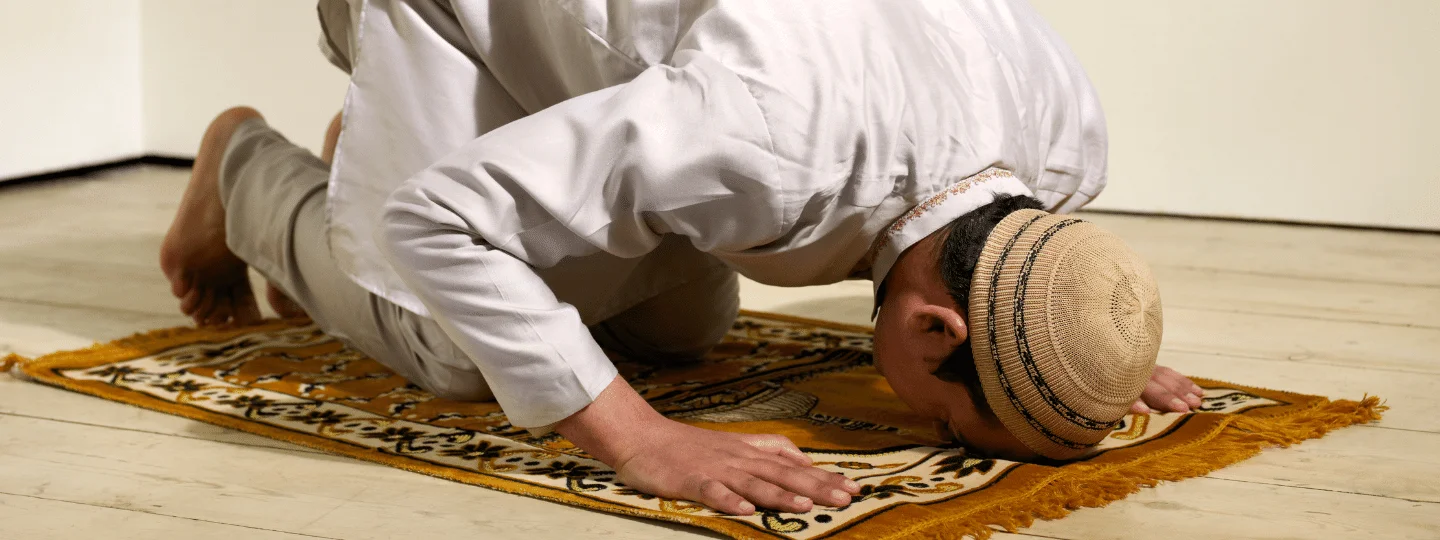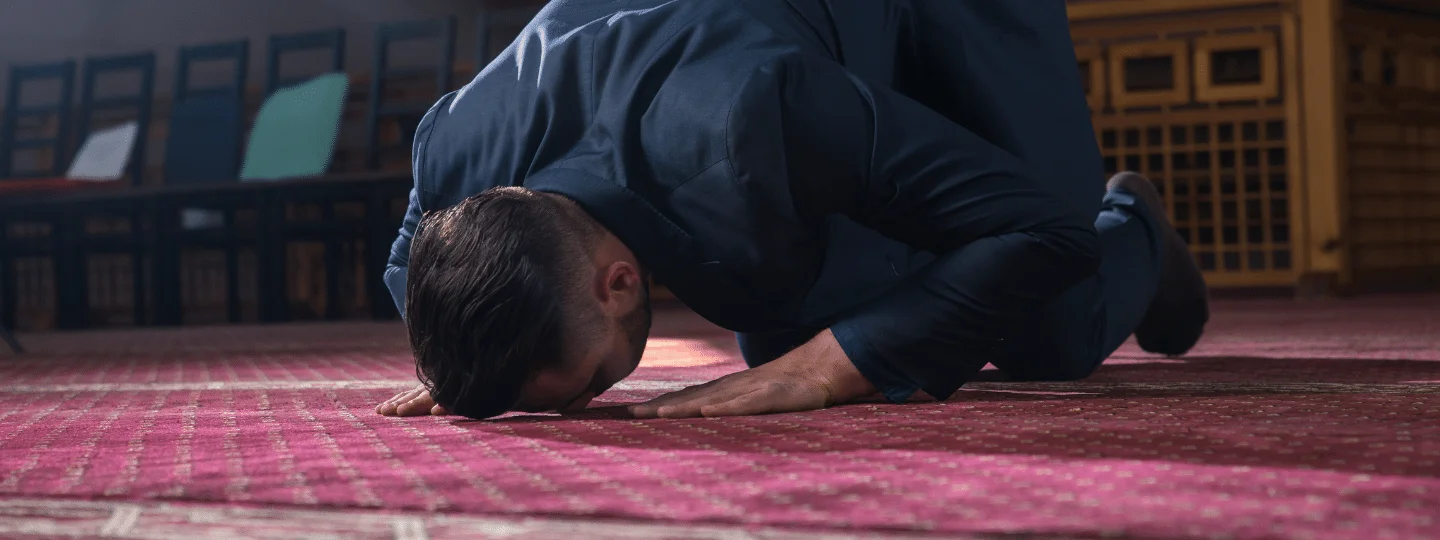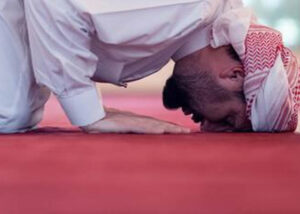I have seen some people make Sajdah (prostration) after they complete Salah, is this recommended?
Quran
Hadith
Islamic Text
It is not recommended to perform Sajdah (prostration) after the completion of Salah. Rather leading Hanafi scholars considered this to be Bidah (innovation).
عَائِشَةُ أَنَّ رَسُولَ اللهِ صَلَّى اللهُ عَلَيْهِ وَسَلَّمَ قَالَ: مَنْ عَمِلَ عَمَلًا لَيْسَ عَلَيْهِ أَمْرُنَا فَهُوَ رَدٌّ
(Sayidah) Aishah (May Allah Most High be pleased with her) narrated that the Messenger of Allah ﷺ said, ‘Whoever innovates something in this matter of ours, that is not of it, will have it rejected.’ (Sahih Muslim, 1718 – 18).
Regarding the issue of Bidah (innovation), the Shariah is strict when it relates to religious matters or acts of ritual devotion. It is not strict when it comes to non-ritual matters, rather there innovation will be considered on its own merits. Since Sajdah (prostration) is a devotional act of ritual worship, one is not free to introduce it to any situation.
In addition even permissible acts can become reprehensible if they lead to Bidah regarding the belief of the people. It is this consideration that caused many Hanafi Imams to assert that the Sajdah (prostration) performed after the completion of Salah is a Bidah, and therefore Makruh Tahriman (sinful).
وَسَجْدَةُ الشُّكْرِ: مُسْتَحَبَّةٌ بِهِ يُفْتَى لَكِنَّهَا تُكْرَهُ بَعْدَ الصَّلَاةِ لِأَنَّ الْجَهَلَةَ يَعْتَقِدُونَهَا سُنَّةً أَوْ وَاجِبَةً وَكُلُّ مُبَاحٍ يُؤَدِّي إلَيْهِ فَمَكْرُوهٌ
Imam al-Haskafi: Sajdah Shukr is Mustahab (recommended) according to the Fatwah position. However, it is Makruh after Salah. This is due to the fact that ignorant people believe it is Sunnah or Wajib. Every Mubaah (permissible) action that leads to such beliefs is Makruh.
(قَوْلُهُ لَكِنَّهَا تُكْرَهُ بَعْدَ الصَّلَاةِ) الضَّمِيرُ لِلسَّجْدَةِ مُطْلَقًا. قَالَ فِي شَرْحِ الْمُنْيَةِ آخِرَ الْكِتَابِ عَنْ شَرْحِ الْقُدُورِيِّ لِلزَّاهِدِيِّ: أَمَّا بِغَيْرِ سَبَبٍ فَلَيْسَ بِقُرْبَةٍ وَلَا مَكْرُوهٍ، وَمَا يُفْعَلُ عَقِيبَ الصَّلَاةِ فَمَكْرُوهٌ لِأَنَّ الْجُهَّالَ يَعْتَقِدُونَهَا سُنَّةً أَوْ وَاجِبَةً وَكُلُّ مُبَاحٍ يُؤَدِّي إلَيْهِ فَمَكْرُوهٌ انْتَهَى
وَحَاصِلُهُ أَنَّ مَا لَيْسَ لَهَا سَبَبٌ لَا تُكْرَهُ مَا لَمْ يُؤَدِّ فِعْلُهَا إلَى اعْتِقَادِ الْجَهَلَةِ سُنِّيَّتَهَا كَاَلَّتِي يَفْعَلُهَا بَعْضُ النَّاسِ بَعْدَ الصَّلَاةِ وَرَأَيْت مَنْ يُوَاظِبُ عَلَيْهَا بَعْدَ صَلَاةِ الْوِتْرِ وَيَذْكُرُ أَنَّ لَهَا أَصْلًا وَسَنَدًا فَذَكَرْت لَهُ مَا هُنَا فَتَرَكَهَا ثُمَّ قَالَ فِي شَرْحِ الْمُنْيَةِ: وَأَمَّا مَا ذَكَرَ فِي الْمُضْمَرَاتِ أَنَّ النَّبِيَّ – صَلَّى اللَّهُ عَلَيْهِ وَسَلَّمَ – قَالَ لِفَاطِمَةَ – رَضِيَ اللَّهُ تَعَالَى عَنْهَا -: «مَا مِنْ مُؤْمِنٍ وَلَا مُؤْمِنَةٍ يَسْجُدُ سَجْدَتَيْنِ» إلَى آخِرِ مَا ذَكَرَ “. فَحَدِيثٌ مَوْضُوعٌ بَاطِلٌ لَا أَصْلَ لَهُ
(قَوْلُهُ فَمَكْرُوهٌ) الظَّاهِرُ أَنَّهَا تَحْرِيمِيَّةٌ لِأَنَّهُ يُدْخِلُ فِي الدِّينِ مَا لَيْسَ مِنْهُ ط
Imam Ibn Abideen: His saying, but it is Makruh after Salah, the pronoun is regarding Sajdah (prostration) generally. In Sharh al-Munyah, at the end of the book, he narrated from al-Zahidi’s commentary on al-Quduri saying, ‘Doing so without a reason is not a devotional act, nor is it Makruh. As for what is done after Salah, that is Makruh. Since the ignorant believe it is Sunnah or Wajib. Every Mubaah (permissible) action that leads to such beliefs is Makruh.’
Imam Ibn Abideen: The conclusion is that which does not have a specific cause is not Makruh on condition that it does not lead to the ignorant believing it to be Sunnah. For example that which some people perform after Salah. I have seen some of them perform it consistently after Witr (prayer) and claim that it has a basis (proof) and support. So I mentioned to him what has been narrated here (by Hanafi Imams) so he left it. Then he said in Sharh al-Munyah, as for what has been mentioned in al-Mudmaraat that the Prophet ﷺ said to (Sayidah) Fatimah, May Allah Most High be pleased with her, ‘there is no believing man or believing women that performs two Sajdahs…’ It is a fabricated narration, it is baseless and has no (credible) source.
Imam Ibn Abideen: His saying, it is Makruh, what is apparent is that it is Tahreemi. This is because it inserts into the religion something that is not a part of it. (Radd al-Muhtaar).
The above Nusoos (texts) clarify that the Hanafi position regarding an additional Sajdah after Salah is that it is Makruh Tahriman due to it being a Bidah. Therefore, people must refrain from it. Unfortunately there is widespread misunderstanding regarding the issue of Bidah in our communities, with people going to extremes.
Some people consider things to be Bidah when the classical scholars of Islam did not denounce them as Bidah. In more extreme cases, I have found people considering something Bidah although it is mentioned in Hadith (for example group Dhikr). The opposite extreme is also prevalent. Where people are not willing to consider anything to be Bidah. They seem to behave as if the concept of Bidah does not exist in Islam. This is clearly contradictory to the Quran, Hadith and teachings of the classical scholars of Ahl al-Sunnah.
The truth is that Bidah is a major concern in Islam. However, it is not permitted to consider something established in the Sunnah to be Bidah. The Muslim must study this important concept from the works of the classical scholars of Islam to avoid the contemporary extremes people have fallen into.
And Allah Most High Knows Best
-Answered by Shaykh Noorud-deen Rashid (26.11.2022)
See also:
What is Bidah (religious innovation)?
Is it permitted to attend Dhikr gatherings (Majlis Dhikr)?
Is every Bidah a good Bidah (Bidah Hasanah)?
See also video:






